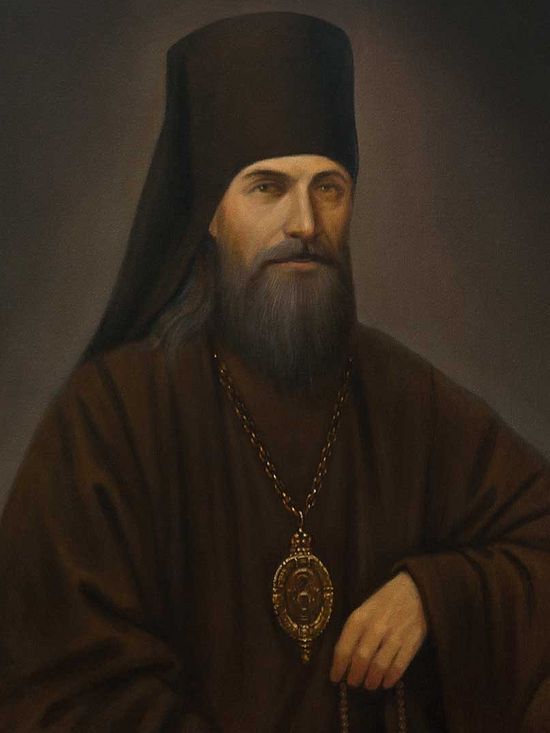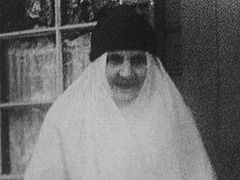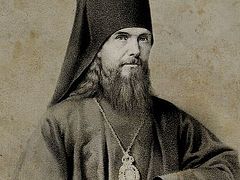 St. Theophan, the Recluse of Vysha
St. Theophan, the Recluse of Vysha
All of St. Theophan’s life was a path to Christ. Why is that so? The saint well understood that mankind’s first parents chose the path of sin, and all our problems proceeded from this. “Man fell and perished in his fall. For his salvation the Only-Begotten Son of God came to earth and showed the path of salvation.” We are free people; we can of course take our own path, fall again and again, feeling the pain and weight of our own errors. Or we can do it differently—we can follow after Christ, which will be salvific for us.
What path has Christ shown us? How can Orthodox Christians come closer to Christ? St. Theophan pondered this question very much, attentively reading the Gospel, testing whatever came to his mind by Church Tradition and living spiritual experience.
Let’s take a brief passage from his Thoughts for Each Day of the Year. It’s St. Theophan’s “thoughts” on the gospel of Luke, chapter 17. The saint takes verses 20–37, in which Christ explains to His disciples that He must through suffering enter into His royal glory. The Lord commands the disciples to walk God’s path—without wavering, decisively abandoning everything that is condemned to perish. It’s impossible to move forward along God’s path and look back as did Lot’s wife. She perished for that reason.
The Guidance of God’s Word for people of the Biblical era
First of all, St. Theophan turns his attention to what people heard from Christ two thousand years ago. Christ’s disciples believed in Him as the anointed King, and awaited His glorious enthronement. Some considered that He would reign after leading an liberating uprising against the Roman occupation. Christ does not want his disciples to err regarding His Kingdom. There will be no uprising. There will be something else: the sudden and glorious Coming of the Son of God, clearly seen by everyone.
From the gospel reading St. Theophan choses one theme:
For as the lightning, that lighteneth out of the one part under heaven, shineth unto the other part under heaven; so shall also the Son of man be in his day (Lk. 17:24), the Lord added, But first must he suffer many things, and be rejected of this generation (Lk. 17:25)… All the time before that day will be the time of the Lord’s suffering. He suffered in His own Person at one particular time; and after that His suffering continues in the person of the faithful.”
It would seem that this begs the exegete to delve into the theme of the Cross: One of Christ’s disciples mistakenly expects that Christ will restore David’s reign in Jerusalem, and that is why Christ prophecies His sufferings on the Cross, which will be salvific for all His disciples. It is no accident that it was written that Jesus is the “King of the Jews” on His Cross and that a crown of thorns was mockingly placed on His head as a caricature of a king’s crown. St. Theophan indicates the theme of Golgotha, but he doesn’t develop it.
Now, standing next to Christ, the holy hierarch catches another guiding point: The whole time before Christ’s Second Coming is the time of Christ’s suffering. He Himself is tormented on the Cross on Holy Friday. Moreover, His suffering continues “in the person of the faithful”. This sounds mysterious… What does it mean? How did the faithful of the Biblical era understand this? For example, the apostles—after all, this concerned their own destiny.
In his non-trivial observation, St. Theophan introduces clarity. He writes about the
“suffering of a believer’s birth, his cultivation in a spirit of preservation from the actions of the enemy both internal and external; for the Lord’s union with His own… is living, for the sake of which everything concerning them is also accepted by Him as what is most important.”
Yes, a person’s conversion to faith in Christ, his spiritual cultivation, protection from enemies—all this is often torturous. Let’s take for example the apostle Paul’s conversion to the faith. Christ appeared to Paul when the latter was an enemy of the faith, organizing persecutions against Christians. Christ said to Paul, “Why are you persecuting Me?” That is, Jesus Christ is the Head of the Church, and as the Head He feels the pain of those Christians whom Paul is persecuting. Then Paul heard the Lord’s command to correct his spiritual path.
It would seem that St. Theophan now describes in detail how important it was for Christians of the Biblical era to receive the Word of God about the sufferings of Christ as the Head of the body of the Church. This was very clearly an era of persecution against the Church!.. But no, the saint hurries from the past to the present.
The gospel sounded forth not only for those who heard and read it in antiquity. The words of the gospel have always instructed people on the sure path, throughout all times. The most important moment of time is now, and it is what we are talking about.
The instructions of God’s Word for St. Theophan’s contemporaries
The Thoughts of St. Theophan, who lived in an Orthodox empire, were published in 1881. St. Theophan again directed himself to Christ, and although there were no persecutions against the Church,
“the Lord definitely suffers very much. The most sensitive sorrow are the falls of the faithful; even more sensitive for Him is apostasy from the faith.”
Every serious sin—our fall—brings great suffering to the Lord. This ascetic observation is applicable to every epoch. And in the nineteenth century, apostasy from the faith was a particular evil of the day.
The saint does not spare the colors in order to describe the harm of antireligious propaganda:
“Speeches and writings that breath unbelief are the fiery arrows of the evil one. In our time, the evil one has opened many such smithies for forging such arrows. The hearts of the faithful ache when they are struck by them and see others defeated; and the Lord also aches with them. But the day of the Lord’s glory will come… Until that time we must endure and pray.”
We recall how educated people of the century before last were drawn to the antireligious books of Voltaire, and then Marx. Propaganda of unbelief penetrated the peasantry under the disguise of scientific enlightenment. St. Theophan was one of the most enlightened men of his epoch; he studied with great interest many sciences and crafts, was successful in them, and knew several foreign languages. He understood that it was not science that was teaching people godlessness. Behind that propaganda of unbelief stand the evil spirit—he is the one pushing people off the right path.
The enemies of Christ will be conquered at the Second Coming; the Lord will appear in all His glory, and “until that time we must endure and pray.” Why exactly endure and pray? Patience and endurance are needed in the struggle against falls—if you’ve fallen, get up and continue on to Christ. If you’ve fallen again, don’t just lie there in the dirt of sin—get up again with repentance and keep on your path to Christ. Prayer is our sure means against unbelief. A person meets with Christ in prayer, communes with Him, and receives living personal religious experience. It is not so easy to knock such a person off the spiritual path with talk such as, “religion is the opium of the people”. Orthodox ascetism teaches us to deflect with prayer the thoughts of unbelief—the arrows of the evil one—that fly at us
I think that St. Theophan formulated the problems of his time and peered into the prospects of the future, into the next century. And he found that the propaganda of unbelief can become bloody persecution against the Church, as it was in the early years of Christianity. This is what Christ warned the apostles about.
Guidance of God’s Word for one man. A plan of action
But what is the Word of God saying to me today? St. Theophan answers this question when he explains the verse, Whosoever shall seek to save his life shall lose it; and whosoever shall lose his life shall preserve it (Lk. 17:33). Saving your life means pitying yourself; and losing your life means not pitying yourself on the path of the Lord’s commandments. If you don’t pity yourself, you will be saved.
And here St. Theophan’s talk changes abruptly; he changes from the plural address to the singular, giving direct pastoral counsel to an individual:
“Labor to watch yourselves over the course of at least one day, and you [plural] will see that
self-pity corrupts everything we do and discourages us from doing anything. Without labor… you [singular] can’t do anything, and you pity yourself too much to force yourself. This is where you stop.”
This is a decisive step in an ascetic explanation of the Gospel. St. Theophan the Recluse gives us spiritual exercises for one or more days.
For one day, watch yourself—how self-pity corrupts your good deeds, how it discourages the desire to do good. This is a concrete plan of action. I will heed the saint’s advice; I will strive to live this day according to God’s word in Luke 17:33. Then I will find myself in the Gospel space; I will become one of the disciples to whom this word was given. If in some cases the commandment will be fulfilled, I will find myself closer to Christ. And then I must thank Him for having placed me on the right path and given me the strength to make that step toward Him. If in some cases the commandment is not fulfilled, I need to repent of this—without self-pity. And this will also open to me the path to Christ. This is the most important thing.
Conclusion
St. Theophan ends his explanation of the gospel of Luke, chapter 17 with some amazing lines written as if in our own days—about time management. That is, about the organization of time, according to which there are four types of work: important and urgent (people have to do them, there is no problem with this), important and not urgent (people put them off till later, which brings them serious problems in life)…
The saint knows this problem of time management well:
“There is work that you have to do whether you want to or not. Such work is done without delay, although it’s hard. But here self-pity is conquered by self-pity. If you don’t do it, you’ll have nothing to eat. And because the work of the commandments is not that kind of work, then because of self-pity it is always put off. Slack is also given for bad deeds out of self-pity. We hate to refuse ourselves what we want, and so the desire gets indulged—and it is either straight-out sinful or leads to sin. Thus, the self-pitier never does what he should, and indulges in what he shouldn’t; and he turns out to be a useless man. What salvation is there in this?”
St. Theophan writes that the key cares of life (that is, getting something to eat) are in the category of important and urgent matters; moreover self-pity helps us get these things done on time. And then the saint shows that fulfilling the commandments is often perceived as an unimportant matter and not urgent! Here we err; this this is the deceitful path from which we have to pull ourselves away in order to get out into the light of God. And if fulfilling the commandments is not an important or urgent matter, then self-pity doesn’t let us do it. It is either put off till later, or the commandments are quickly forgotten. St. Theophan also notes that into important and urgent matters, sinful desires or desires leading to sin are often mixed—in a word, our passions. Then self-pity aids us in indulging the passions without delay.
The saint obviously did not make all these observations while sitting at his desk. The holy hierarch himself strove to live according to God’s word that we read in Luke 17:33). And he exercised himself, labored in them more than one day. He thought through and analyzed the experience he received, and most likely counselled with others about it. He gave thanks to God for what he was able to do. What he wasn’t able to do, he corrected through repentance. He felt how the Gospel, when read through one’s life, places us before Christ, and moves us closer to salvation. And he clarified all this after preparation—he studied what the guidance of God’s gives to ancient Christians, and what it gives to contemporary ones. This is why it was so clear to St. Theophan the recluse that:
the Word of God, “proceeding from God’s lips, illumines the entire path of a God-pleasing life; and whoever is zealous to walk this path sees clearly where to go.”




